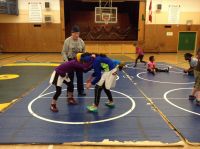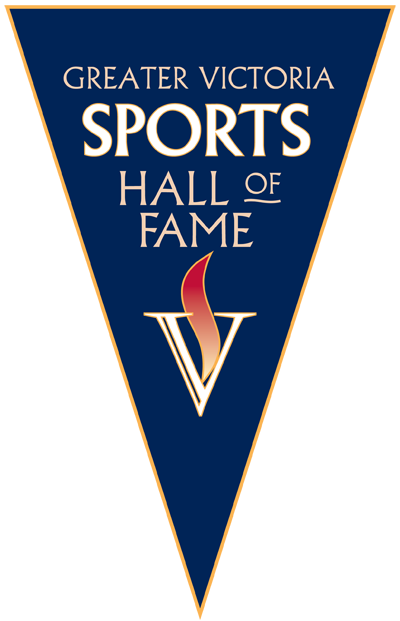Ed was coaching gymnastics at the Victoria YMCA IN 1964 when Art Burgess asked him if he could help by coaching wrestling as well. That conversation turned into a 52-plus year involvement with the sport of wrestling. Ed’s dedication to wrestling led Victoria to become a powerhouse in the late 1960s and into the '70s. Some of Canada’s best wrestlers at that time had their start in the wrestling room at the Y.
In 1969, Ed coached Canadian Wrestlers at the first Junior World Championship held in Boulder, Colorado. Taras Hryb won the bronze medal at that event and become the first Canadian to win a medal at a Wrestling World Championship since the Berlin Olympics in 1936. After that event, wrestlers who have had their start with Ed have won a number of World Championship, Commonwealth and Pan American Games medals, including Clark Davies, 1981 World Senior Silver Medalist.
The quality of wrestlers that were coached by Ed in those days was amazing. Ironically, there was no wrestling program at the University of Victoria and so many outstanding athletes went to UBC where they excelled. In one year, five wrestlers from Ed’s program all won gold at the CIAU championships and secured the team title for UBC.
In those early years, Ed also became involved as a wrestling official. Nationally he officiated at many Canadian Championships in the early '70s, and he represented Canada as an international FILA official in Mexico City and in Santa Domingo.
Ed continued to coach junior and senior high wrestlers in the '80s and his involvement with the sport continues to this day. Ed chaired the Organizing Committee for the BC High School Championships in 1969 and 1994, the 1997 North American Indigenous Games, and two BC Summer Games in Victoria and in Nanaimo. In addition he was the Assistant Technical Director for wrestling at the 1993 Commonwealth Championships and the 1994 Commonwealth Games.
More than five decades later and now over 80 years old, Ed is still coaching. After his retirement from teaching, he continued to coach at the club he started, the Victoria Commonwealth Bulldogs. Recently Ed was honoured as one of the original coaches at the first BC High School Wrestling Championship in 1965, but the real news was that he was still actively coaching at the 2015 event.
When Ed goes to coach at a school, he not only coaches wrestling -- he also instils a holistic approach to sport with an emphasis on proper mental preparation, nutrition, character development and sportsmanship.
SPONSORED BY BRIAN ZELLEY ACCOUNTING
The excitement of the Montreal 1976 Olympic Games sparked in Bruce a deep desire to succeed in sport. He recalls that he “was one of the shortest kids in my school and really uncoordinated. I was the kid who rushed for the outfield in gym class because I knew that no one could hit the ball that far and so I wouldn’t embarrass myself. I was not an athlete. In fact, if they had a vote in my school for the least likely to ever be an Olympian, I would have voted for myself.” Being one of the smallest kids in his class, there were few obvious sports at which he could succeed. All of that changed when he was introduced to long distance running while at summer camp.
By the time he was 13, he had completed two marathons, and his early start launched a winning high school track career. He attended and competed at the University of Western Ontario from 1985 to 1989, before moving west to attend teacher training at Simon Fraser University. He has resided in BC ever since, and in Victoria since 1996. It was after his move to BC, that his running took off and he qualified for his first national team.
Bruce’s international accomplishments as a marathoner include representing Canada at the 1996 and 2000 Olympic Games, the IAAF World Athletics Championships (1995, 1997, 1999, 2001), the Commonwealth Games (1994), and the 2003 Pan American Games where he won a silver medal. He was a frequent winner of local races such as the Times Colonist 10k and various events at the Victoria Marathon. In addition, he was the first three-time winner of the California International Marathon, and the last Canadian to win the National Capital Marathon. As a masters athlete, he won the New York City Marathon and placed second at the Boston Marathon.
A further level of significance in Bruce’s accomplishments was his appointment to lead the Western office of the Canadian Olympic Committee in Vancouver. Under his guidance the office took care of all of the COC’s education program and community relations west of Toronto. Bruce’s primary responsibility was the Canadian Olympic School Program, which provided Olympic-themed classroom activities for close to one million students.
Since retiring from international competition, Bruce has held various roles within the Provincial Government. He has made valued contributions to the Canadian sports system including his work with Athletics Canada, BC Athletics, BC Athlete Voice, Olympians Canada and the Canadian Olympic Committee. He currently coaches young runners, some of whom have qualified to compete on national and provincial teams.
SPONSORED BY HOWE & GRAMLICH / WEALTH MANAGEMENT


















